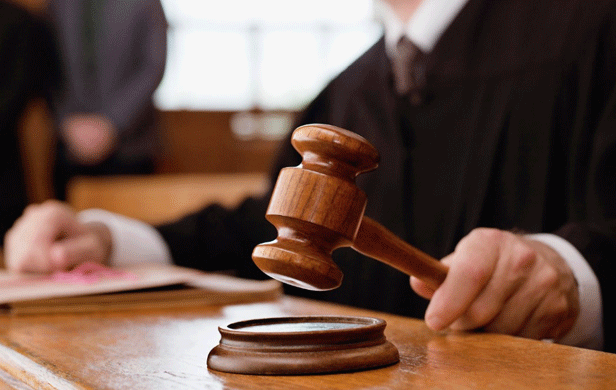
I’m a lawyer by trade and recently helped celebrate the 60th anniversary of the UBC Law Class of 1956. Like all of my classmates, I am very proud of our Class, one of those of those extraordinary comings together of individuals who somehow become an identifiable entity.
Out of the 56 who graduated, 14 became judges. They were all a great credit to our Class, the Bar and the Bench. It is therefore with considerable trepidation that I criticize the Bench in anyway.
This, perhaps, is the genesis of the problem. Judges are seldom criticized and, when they are, it seems that every lawyer in the country springs to their defense, stating that they don’t have the ability to defend themselves because of their lofty position.
But they must be held to account when they go off base.
This is especially so because they are in that protected position and can only be fired under the most exhausting of procedures.
“Shock Jock”
I want to quickly recount a personal story which only troubles me because it indicates an exceptional protection for judges no one else has.
A few years ago, as a litigant/defendant, I won a very important libel case in the Supreme Court of Canada with the entire bench sitting and the vote being 9-0 in my favour. I had nothing to do with this other than state the words complained of – I was just a spectator.
I’m proud of my broadcasting career – I admit that I was sometimes outspoken but my professionalism was recognized by my receiving the Bruce Hutchison Lifetime Achievement Award from the Jack Webster Foundation, the Michener Award, the highest award in Canadian broadcasting, and election to the Canadian Association of Broadcasters’ Hall of Fame. I was, therefore, indeed pissed off when one of the judges referred to me as a “shock jock”, the equivalent of me referring to him as a former shyster.
I wrote to the judge and politely but firmly demanded an apology and, as you might imagine, got a bunch of mumbo-jumbo back from a secretary.
Not content, I wrote to Chief Justice McLachlin and demanded from her that I receive an apology and I asked whether or not judges were shielded from the normal strictures of good manners and appropriate behaviour towards people who appear before them. Again, I received mumbo-jumbo.
I was taught as a young man by my lawyer idol, M.M. McFarlane, to stand up for my rights as a barrister and since he became Treasurer of the Law Society, a judge of both the Supreme Court and the Court of Appeal, it was authoritative advice and my candid discussions with the Supreme Court of Canada are not the only ones I had with the Bench.
Unjust treatment
For most of my years in practice, ending in 1975, women were treated very badly by all branches of the Bench. They were put down at every opportunity, their cases were trivialized, and if they won the case, they felt a great deal more humiliation than pleasure.
Recently, we have seen three judges hailed before the Special Committed for outrageously insensitive remarks to young women who have been sexually attacked. It is hard to believe that any man today would utter these words, much less a learned judge, but they did.
When I moved to Kamloops to practice in 1969, it did not take me long to learn that First Nations were treated like rubbish by the courts and the prosecutors, usually RCMP officers.
On one occasion I was in court in Prince George waiting to set a trial date and I watched the trial of a young First Nations lad accused of driving while his license was suspended. It had been suspended by the superintendent, not a judge, and the distinction is an important one because in the latter case it is contempt of court and usually brings a jail sentence and in the former it’s like getting a serious traffic ticket and you are fined.
At the close of the case, the judge looked around the courtroom and asked if there were any members of the press. There were not, so the judge, even though there were no previous offences, sentenced him to six months in jail. I wish that I’d had the courage to jump up and raise hell but I didn’t. I wrote the Attorney General but, sadly, nothing came of it.
On another occasion I represented two young First Nations lads who had been fairly seriously hurt in a traffic accident and the Supreme Court judge who tried the case treated them as if they were barely above imbecility, made it pretty clear that people of this stature really didn’t deserve damages anyway and dismissed the case. I’m happy to say I took the matter, pro bono, to the Court of Appeal, which sorted things out appropriately.
Six months in jail for just smoking pot
The reason that tipped the balance in favour of this article today was learning that both Terry Jacks and his former wife Susan Jacks are quite ill in hospital. I remain a huge fan, especially of the Poppy Family of the the 60s.
When I wrote Terry and Susan wishing them well, I could not stop humming, from the Poppy Family, “Oh, dear, what can the matter be?” The key line in the song is “six months in jail for just smoking pot”.
I flashed back to a case I took for a 16 year old boy in the 60s who’d been charged with smoking pot. His father, a friend of mine, was horrified to learn that there was nothing I could do to prevent his son from going to adult jail for six months. The BC Court of Appeal had mandated that to be the minimum sentence, no matter what the circumstances were.
These old men, who had no compunction about drinking a belly full of good scotch whiskey when they felt like it, were sending kids to jail for smoking a joint.
You may think lawyers are insensitive but that just isn’t so. I can still see that young man, tears rolling down his face, and his father and mother hanging onto him as he was taken away to the slammer for smoking something illegal.
A test for judges
All of this is simply to make this point: Judges do an admirable job day in and day out – it is not an easy job and it is one which I was once offered and couldn’t turn down fast enough.
When they do take the position, however, there must be some sort of testing of their attitudes, to determine their suitability to judge people based upon the year they’re living in, not the one in which they went to school.
If you had asked me a few months ago whether or not any judges in Canada would tell a woman who had been raped that she should have clamped her knees together, I would not have believed it. Surely to God those days are long behind us.
Well, we know that three Supreme Court judges would have proved me wrong and one has to wonder if they are the only ones or, more likely, symptoms of a much larger problem.
Leaving aside the horrible injustice committed by the judges I have referred to, think of the terrible impact they have upon the people who were forced to trust them to give them her Majesty’s justice.
It is now the duty of our minister of justice, The Honourable Jody Wilson-Raybould, herself First Nations, to put in place procedures to determine if judges under her jurisdiction have been properly examined as to their suitability to judge people on the law and the moral standards of today – not something they think the law should be or standards they learned 70 years ago in much different times.


I do not imagine that this was the easiest piece that you have written, but it one of your best.
Onward
I, too, appreciated your very clear-headed piece of judges and how some of them need what I always called an “attitude adjustment” once in a while.
Could not believe that the judge from Alberta whose most inappropriate comments to a rape victim only needed a short course in how to deal with women in the courtroom in order to retain his exalted position. Imagine how this particularly unfortunate woman would have viewed the whole justice system if she hadn’t had the wherewithal to complain to the courts? It only takes one bad apple to taint everyone else in a similar position.
Thank you for your most recent article — as well as your blog in general
Your lawyer training is showing because you are being a over protective of the judges some of whom, in my opinion, would benefit from a few years in the slammer.
Cory J in R. V Koypto (Ont CA)
So long as comments made on matters of public interest are neither obscene nor contrary to the laws of criminal libel, citizens of a democratic state should not have to worry unduly about the framing of their expression of ideas. The very life-blood of democracy is the free exchange of ideas and opinions. If these exchanges are stifled, democratic government itself is threatened.
As a result of their importance the courts are bound to be the subject of comment and criticism. Not all will be sweetly reasoned. An unsuccessful litigant may well make comments after the decision is rendered that are not felicitously worded. Some criticism may be well founded, some suggestions for change worth adopting. But the courts are not fragile flowers that will wither in the hot heat of controversy. Rules of evidence, methods of procedure and means of review and appeal exist that go far to establishing a fair and equitable rule of law. The courts have functioned well and effectively in difficult times. They are well-regarded in the community because they merit respect. They need not fear criticism nor need they seek to sustain unnecessary barriers to complaints about their operations or decisions”.
In many cases, there is good reason for criticism of judges. They are paid very well and we expect them to perform very well.
Sometimes judges perform very badly even corruptly.
Really appreciate your clear and concise perspective on things. Keep up your great work. Thank you.
Excellent article, Rafe! Is makes perfect sense again.